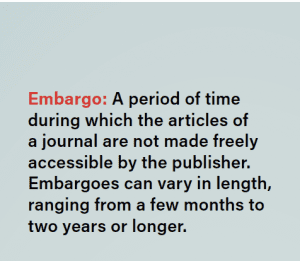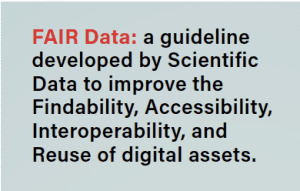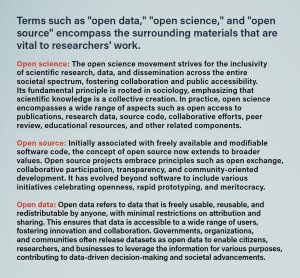A treasure trove of published research is locked behind publisher paywalls and out of reach for many underresourced and Minority- Serving Institutions (MSIs). Additional research remains entirely inaccessible, as researchers are hindered by traditional academic publishing models that require exorbitant fees for publication.
Diversity, equity, and inclusion advocates across higher education, from faculty and researchers to librarians and archivists, alongside independent organizations and the federal government, are drafting policy changes, signing increasingly equitable licensing agreements, and addressing the exorbitant costs of publishing in an effort to break down knowledge barriers and achieve greater access.
The Open Knowledge Foundation, an organization of global experts dedicated to advancing the availability of information for universal use and participation, explains, “Knowledge is open if anyone is free to access, use, modify, and share it — subject, at most, to measures that preserve provenance and openness.”
In academic institutions, this is most commonly referred to as “open access,” which focuses on the ability to freely utilize published research from academic and peer-reviewed journals. But this idea is also reflected in the concepts of open source, originally applied to software code and computer programs; open data, which refers to the data and information generated in the world beyond academic confines; and open science, a practice that makes publicly available the resulting data, lab notes, and research processes of scientific advancements.
Strong White House Support for Open Science
Broad public awareness of inequitable knowledge access is not a recent development. In 2013, under the Obama administration, the Office of Science and Technology Policy (OSTP) released the “Memorandum on Increasing Access to the Results of Federally Funded Research,” a document that provided policy guidance to increase public access to the “direct results of federally funded scientific research” and required federal agencies with research budgets over $100 million annually to prepare coordinated policies that would meet that goal.
In 2022, the Biden administration commended the agencies impacted by that memorandum, all of whom had made progressive plans and policies to support greater access, and then took additional steps by expanding the original guidance regarding data sharing plans and addressing the issue of publication embargos. Shortly after, OSTP declared 2023 the year of open science, a targeted effort to advance open science policy, drive more equitable outcomes, and provide increased access to the results of federally funded research. 
Chris Marcum, assistant director for open science and data policy at OSTP at the time the year of open science was announced, celebrates the many noteworthy accomplishments that resulted. In his essay “2023: A Year of Open Science in Review,” Marcum reflects on milestones in public, private, academic, and federal sectors, including NASA’s free online release of their Open Science 101 curriculum, and the Open Pediatric Brain Tumor Atlas established by the Children’s Brain Tumor Network and the Pacific Pediatric Neuro-Oncology Consortium, among others.
Additionally, Marcum noted that the Federation of American Scientists (FAS) called for legislative development of an Open Disaster Data Initiative during the year of open science. This effort toward open access to the collection, validation, and sharing of scientific data and research on disaster resilience, vulnerability, and loss is particularly important for disadvantaged communities who, according to the FAS policy brief, “often lack access to critical lifesaving data.”
A broad range of colleges and universities, and the libraries that serve them, took advantage of the momentum created by the year of open science. Marcum noted that alongside the private and federal agency-centered progress in the pursuit of greater transparency, “Many university libraries participated in the year of open science with an incredible array of activities throughout the year.”
Libraries’ Innovative Advocacy for Open Knowledge
Carnegie Mellon University (CMU) Libraries, a recipient of the 2024 Insight Into Diversity Library Excellence in Access and Diversity (LEAD) Award, has long valued a commitment to open knowledge. In 2018, CMU Libraries founded the Open Science & Data Collaborations program, whose team provides services and infrastructure for open research.
“Knowledge is open if anyone is free to access, use, modify, and share it — subject, at most, to measures that preserve provenance and openness.”
Open Knowledge Foundation
In 2023, CMU Libraries held numerous events throughout the year that included “learning opportunities, chances for fostering connections and relationships within our campus community, and lively conversation on the future of open science,” said Melanie Gainey, Open Science program director.
At one event, industry moderators and life science research panelists led a virtual roundtable, “In Conversation: The Evolving Landscape of Data Sharing,” where they discussed data sharing challenges and opportunities, and explored how government policy changes can influence research communities. In partnership with DNAnexus, a cloud computing and bioinformatics company, CMU Libraries also hosted a uniquely collaborative hackathon where teams worked together to solve a dedicated portion of large biomedical models, the results of which were shared publicly after the event.
The University of California San Francisco (UCSF) Library director of data science and open scholarship, Ariel Deardorff, shared highlights of the library’s participation in the year of open science, including co-hosting the Bay Area Open Science Group. For Bay Area researchers and educators who strive to implement open science into their scholarly pursuits and academic curricula, this growing community’s gatherings and speakers offer significant support. The group created a training tool, available online as an open curriculum module, that helps researchers and other stakeholders begin a dialogue about open science team agreements and advocate for the creation of outreach plans using those agreements.
Of particular importance to UCSF Library is the issue of equity in academic publishing. Anneliese Taylor, head of scholarly communication at the library, co-hosted “Publishing for Equity: A Panel Discussion on Anti- Oppressive Publishing,” a webinar that included UCSF faculty members alongside publications expert Charlotte Roh. The webinar offered perspectives on common issues in academic publishing, such as inclusive language and providing equitable credit, and spoke about ways to challenge the perpetuation of stereotypes.
Taylor was also integral to the launch of Diversity, Equity, and Inclusion in Scholarly Communication, a resource created collaboratively by a University of California-wide team that provides community support as faculty and researchers seek to improve the equity of their scholarly communication and create an environment that supports diverse perspectives.
With a shared interest in the equity of academic publishing, Florida State University Libraries established the Open Scholars Project (OSP) community of practice, a collaborative network for researchers and practitioners with an interest in open access publishing, open science, and FAIR data. The group meets monthly, and includes faculty, graduate students, postdoctoral scholars, and practitioners. The primary objective of OSP is to foster connections among individuals across various disciplines and create a nurturing environment for mutual learning, candid discussions, and the application of open principles to research practices.
First convened in 2021, OSP hosted their inaugural Open Scholars Project Symposium in 2023, with in-person and online participant-driven speaker sessions. The symposium focused on open science, including open access publishing, open data, and more. 
There is a growing movement across platforms, agencies, and institutions to address the challenges created by traditional academic publishing models, both from the perspective of those who seek access to published research and those who wish to publish their own.
Solving the Publishing Problem
The traditional academic publishing model has a history that spans several centuries, beginning with the establishment of the first scientific journals in the 17th century. As scholarly research and academic institutions expanded, print journals became the primary method of publishing research, and out of that growth came the rise of the subscription-based model, where libraries and universities bore the cost for institutional access to those journals.
The advent of the digital revolution saw academic publishing transition from primarily print to digital formats, but even then the traditional model prevailed and faced criticism for its high subscription costs and restricted access. These barriers particularly affect underresourced institutions and MSIs, whose budget constraints force them to make choices about which subscriptions to purchase, and individuals without an institutional affiliation, who find themselves blocked by paywalls. This unequal access has led to the open access movement and the development of alternative publishing models. 
The open access movement continues to gain momentum as scholars, libraries, and institutions advocate for freely accessible research. And organizations like the NorthEast Research Library (NERL) Consortium, a unified collective of higher education institutions, actively work to strengthen open access and equitable publication models.
With a stated mission of “building and supporting alliances between higher education and the information industry, NERL serves as an advocate for the collective power and influence of academic libraries and their parent institutions.” By negotiating agreements for the licensing and purchase of online products and services, NERL’s core membership of 30 research-intensive institutions and more than 110 affiliate member institutions benefit from favorable terms.
One member institution, Syracuse University Libraries (Syracuse), is participating in a groundbreaking open access pilot program with Elsevier, a leading global publisher of scientific data and research, that “has been quietly operating very successfully for a couple of years now,” says Scott Warren, senior associate dean for research excellence at Syracuse. “It’s an unusual agreement in that it opened up years of retroactive content that was not previously available to us.” The terms of this agreement, which most of the members signed on for, was negotiated by NERL.
Warren says that while those kinds of programs are certainly beneficial for students and faculty, Syracuse is also developing read and publish agreements that allow authors at the university to publish their scholarly contributions as open access. This would offer a single annual-payment model that controls costs for the institution, streamlines the publication process, provides authors with no-fee publication options, and allows their work to be available for anyone to use. Syracuse has signed agreements with 10 publishers, most recently the Association for Computing Machinery.
“These [read and publish] agreements all have slightly different terms, and some of them will cap how many they are willing to publish in a year. But when individual authors are paying $2,000 to $3,000, sometimes as much as $12,000 to publish [an article] as open access, the end result of the agreement is a benefit to both the author and the institution,” Warren explains.
Indiana University-Purdue University Indianapolis (IUPUI), also a recipient of Insight’s 2024 LEAD Award, established the IUPUI Open Access Fund in 2013 in an effort to support the scholarship of graduate students and faculty who want their work published in open access journals. The fund covers the cost of reasonable publication charges and has seen the open access publication of articles by IUPUI scholars more than double since its inception.
The fund works in tandem with IUPUI’s Open Access Policy, adopted in 2014, which set as standard practice that the published scholarship of university authors is made freely available through ScholarWorks, the library’s institutional online repository. Through these commitments to access, IUPUI seeks to address the inequity of traditional publishing models.
University libraries are increasing pressure on major academic publishers to create sustainable models for publication of and access to scholarly research. Through consortiums like NERL, or by creating institutional solutions to the ongoing issue, institutions are pushing back against the traditional models and finding innovative and successful alternatives.●




















